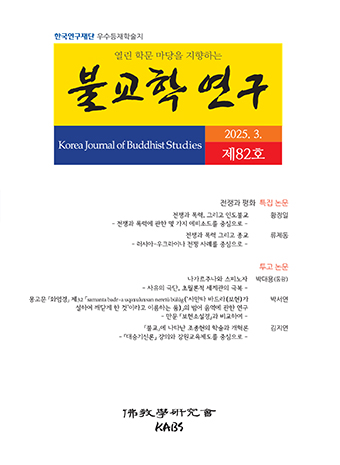초기/인도불교
Indian Buddhists’ critiques of the Veda, attested from the early canonical sources, focused on disproving the superhuman ability of the supposed authors of the Veda, the Vedic
This paper suggests that this change in Buddhist critiques of the Veda needs to be read in the background of Kumārila’s (c. 7th cen.) formulation of the Mīmāṃsaka doctrine of the intrinsic validity of cognition (
바라문교의 성전인 베다(Veda)에 대한 불교도들의 비판은 『떼윗자숫따』(Tevijja Sutta)와 같은 초기경전에서부터 발견되며, 이는 6세기까지 주로 베다를 지은 선인(ṛṣi)들의 자질을 문제 삼는 방식으로 이루어져왔다. 하지만 미망사(Mīmāṃsā)학파가 불교의 주요 논적으로 등장한 이후, 다르마끼르띠(Dharmakīrti, 7세기)의 저작 『쁘라마나바르띠까』(Pramāṇavārttika)에서부터 불교도들은 기존의 베다 비판 방식을 버리고 베다의 불가해성을 증명하여 베다의 권위를 비판하려는 태도를 보이기 시작한다. 본고는 이와 같은 인도불교도들이 베다를 비판한 방식의 전환이 어떠한 배경 속에서 이루어져 있는지를 탐구하고자하는 문제의식 하에 작성되었다.
이를 위해 7세기 미망사학파의 논사 꾸마릴라(Kumārila)가 그의 저작 『슐로까바르띠까』(Ślokavārttika)에서 개진한 인식의 본유적 타당성(svataḥprāmāṇya) 이론을 분석하고 다르마끼르띠의 베다 비판 방식을 꾸마릴라의 베다로부터 일어나는 인식의 타당성 증명 방식과 연관지어 독해한다. 처음 두 절에서는 우선 『미망사쑤뜨라』(Mīmāṃsāsūtra)와 『샤바라의 주석』(Śābarabhāṣya)에 암시되어 있는 아이디어들이 어떻게 『슐로까바르띠까』에 이르러 인식의 본유적 타당성 이론으로 확장되었는지를 탐색하고 그것이 어떻게 베다의 타당성을 보증하는데 적용될 수 있는지 살펴보았다. 이후 마지막 절에서는 다르마끼르띠의 베다 비판의 특징적인 논의들이 꾸마릴라의 인식의 본유적 타당성 이론과 함께 읽혔을 때, 다르마끼르띠의 주장이 꾸마릴라의 이론을 역으로 이용하여 베다의 무의미성을 논증하는 행위로 읽힐 수 있다는 점을 보이고자 하였다.
- Madhyamakahṛdayakārikā KAWASAKI, Shinjo (川崎 信定). 1992. 『一切智思想の研究』 [
A Study of the Omniscient Being (sarvajña) in Buddhism ], Tokyo: Shunjusha (春秋社), 407-471. - Mīmāṃsāsūtra 1.1.1-5 See
Śābarabhāṣya . - Pramāṇavārttika See
Pramāṇavārttikasvavṛtti . - Pramāṇavārttikasvavṛtti GNOLI, Raniero. 1960.
The Pramāṇavārttikam of Dharmakīrti. The First Chapter with the Autocommentary . Rome: Instituto Italiano per il Medio ed Estremo Oriente. - Śābarabhāṣya FRAUWALLNER, Erich. 1968.
Materialien zur ältesten Erkenntnislehre der Karmamīmāṃsā . Wien: Verlag der Österreichischen Akademie der Wissenschaften. - Ślokavārttika (ŚVK) See KATAOKA 2011, vol. 1.
- 『阿毘達磨大毘婆沙論』 T1545
- 『阿毘達磨順正理論』 T1562
- 『成實論』 T1646
- ELTSCHINGER, Vincent. 2012.
Caste and Buddhist Philosophy: Continuity of Some Buddhist Arguments against the Realist Interpretation of Social Denominations . trans. by Raynald PRÉVÈREAU. Delhi: Motilal Banarsidass. - ELTSCHINGER, Vincent, KRASSER, Helmut, and John TABER. 2012.
Can the Veda Speak? Dharmakīrti against Mīmāṃsā exegetics and Vedic authority. An annotated translation of PVSV 164,24-176,16 , Wien: Österreichische Akademie der Wissenschaften. 10.1553/0x002c91d1 22860115 PMC3408446 - FRAUWALLNER, Erich. 1961. "Landmarks in the History of Indian Logic,"
Wiener Zeitschrift für die Kunde Südasiens und Archiv für indische Philosophie , Bd. 5, 125-148. - GAKMUK (각묵스님) tr. 2006. 『디가니까야 1』 [
Dīghanikāya 1], 초기불전연구원(Center of Early Buddhist Studies) - HAM, Hyoung Seok (함형석). 2014. 「다르마끼르띠의 "베다의 저자 부재설"(Vedāpauruṣeyatva) 비판」 [Review of
Can the Veda Speak? (ELTSCHINGER et al. 2012)], 『불교학리뷰』 (Critical Review for Buddhist Studies ), vol. 15, 359-368. - HAM, Hyoung Seok (함형석). 2019. "Śāntarakṣita's Prioritization of Dharmakīrti's Thesis over Bhāviveka's in His Critique of Vedāpauruṣeyatva,"
Journal of Indian and Buddhist Studies (印度学仏教学研究), vol. 67, no. 3, 1118-1123. 10.4259/ibk.67.3_1118 - HAM, Hyoung Seok (함형석). 2020. "Bhāviveka and the Equality of the Four Castes,"
Journal of Indian and Buddhist Studies (印度学仏教学研究), vol. 68, no. 3, 1180-1186. 10.4259/ibk.68.3_1180 - KATAOKA, Kei. 2002. "Validity of Cognition and Authority of Scripture,"
Journal of Indian and Buddhist Studies (印度学仏教学研究), vol. 50, no. 2, 11-15. 10.4259/ibk.50.1026 - KATAOKA, Kei. 2011.
Kumārila on Truth, Omniscience, and Killing . 2 vols. Wien: Verlag der Österreichischen Akademie der Wissenschaften. 10.1553/0x0028e84f - LEE, Ji-soo (이지수). 1995. 「다르마와 베다에 대한 초기 미망사학파의 견해: 『샤바라 브하샤』(I.i.S.1-5)를 중심으로」 ["Early Mīmāṃsā on Dharma and the Veda"], 『인도철학』 (
The Journal of Indian Philosophy ), vol. 5, 203-234. - SILK, Jonathan. 2008. "Putative Persian Perversities: Indian Buddhist Condemnations of Zoroastrian Close-Kin Marriage in Context,"
Bulletin of the School of Oriental and African Studies , vol. 71, no. 3, 433-464. 10.1017/S0041977X08000827 - TABER, John. 1992. "What Did Kumārila Bhaṭṭa Mean by Svataḥ Prāmāṇya?,"
Journal of the American Oriental Society , vol. 112, no. 2, 204-221. 10.2307/603701
◆ 약호 및 일차 문헌 ABBREVIATIONS AND PRIMARY SOURCES
◆ 이차 문헌 SECONDARY LITERATURE
- Publisher :Korean Association of Buddhist Studies
- Publisher(Ko) :불교학연구회
- Journal Title :Korean Journal of Buddhist Studies
- Journal Title(Ko) :불교학연구
- Volume : 65
- Pages :1-27
- DOI :https://doi.org/10.21482/jbs.65..202012.1



 Korean Journal of Buddhist Studies
Korean Journal of Buddhist Studies






